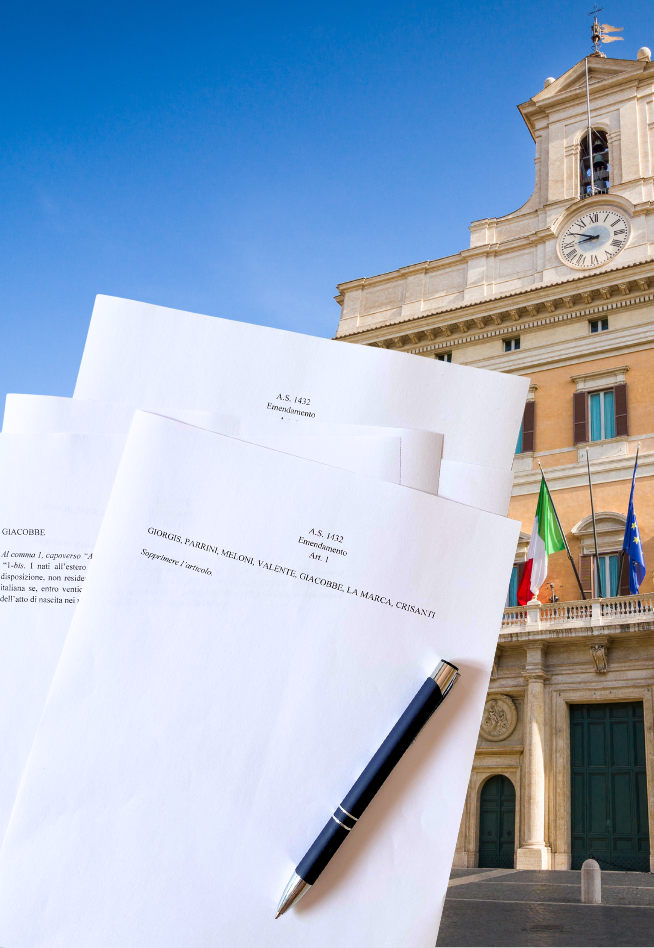An emergency decree (decreto-legge) was approved on March 28, 2025 by the Italian Council of Ministers amending the eligibility rules for recognition of Italian citizenship by descent. The Italian Parliament has 60 days to convert the decree into law, modify it, or reject it. There have been serious concerns regarding the constitutional validity of the decree, which are being discussed in the Italian Parliament. This article will outline the details of the decree, its legal implications, and the process of converting the decree into a regular law.
Proposed Changes Under Decree-law No. 36/2025
Before the March 28th decree, claiming Italian citizenship by descent required proving an unbroken chain of Italian citizenship to an Italian-born ancestor. There were no generational limits, as long as the Italian-born ancestor was alive in 1861 (when Italy became a unified nation).
The March 28th emergency decree temporarily amended the criteria to allow only individuals with a parent or grandparent born in Italy to claim Italian citizenship by descent. For minor children of recognized Italian citizens, under the rules set forth in the decree, it is possible to obtain Italian citizenship if the parent resided in Italy for at least two years prior to their birth, or if the child was born in Italy.
If an application for citizenship was submitted prior to March 27, 2025, 11:59 p.m. Rome time at an Italian consulate, municipality, or Italian court, the previous rules would be applied.
Decree-law no. 36/2025 was an emergency decree introduced by the Italian Council of Ministers, which is a type of legislation used generally in emergency situations where the provisions in the decree go into immediate effect. The decree then needs to be approved by Parliament within 60 days, during which time Parliament will either need to convert it into law as is, convert it with changes, or not convert it at all.
The Process to Review the Contents of the Decree
During the 60-day time period following the issuance of the decree, the Italian Parliament reviews the decree, proposes amendments to it, and checks if it violates the Italian Constitution. If the proposed amendments to the text of the decree are voted on and approved by the majority of the Parliament, the content of the decree will be changed accordingly.
Potential Amendments
There are many potential amendments that could modify the final text of the decree.
Several members of the parliament have proposed a complete suppression of the decree and either a return to the old rules or the creation of a new regular law that regulates the citizenship legibility rules. In fact, a major concern being discussed is that an emergency decree was not the most appropriate piece of legislation to use for regulating the citizenship rights of people. Many have pointed out that the Italian Parliament, a larger representative body made up of hundreds of members, should be making such complex decisions on citizenship laws and not the government (Council of Ministers) through the use of an emergency decree.
A group of members of the parliament has proposed a transition period or interim solutions for the implementation of any new provisions: a “grace period”, allowing time for people to submit their citizenship applications. This is due to the retroactive nature of the decree, which is affecting the birthright of people to claim Italian citizenship by descent. It is already being argued and discussed in the parliament that while the decree was announced on March 28, the provisions were effective as of midnight the day before, which causes concern over the decree’s compliance with the Italian Constitution. This, in fact, created a retroactive deadline, with many already in the process of preparing to apply for Italian citizenship would now be finding themselves ineligible under the new rule. This includes many individuals who were unable to submit their applications through no fault of their own (people who were in the queue or who had their appointment with the consulate scheduled in the future).
Other proposed amendments are regarding changing the limit to the number of generations that can be used to claim citizenship (to allow for individuals of Italian descent to claim citizenship via more removed generations beyond the grandparent).
Finally, several amendments have been proposed to allow minor children of recognized Italian citizens to be able to obtain citizenship upon registration of their birth certificate through the consulate (the only requirements would be that the parent is correctly registered with AIRE and that the registration request is made within a certain period of time from the birth of the child).
It is important to note that this article has covered only the most significant proposed amendments that have been made public thus far and there could be other amendments being discussed within the parliament that are not being covered in this article.
What happens next?
There will be continued ongoing discussions and amendments to change the decree. Before the close of the 60-day window, there will be a vote on the proposed amendments, which could lead to major changes. It’s also important to remember that if the decree is not converted into law, it will no longer be effective and will be retroactively invalid.
For current updates and information on the possible conversion of the decree into law, be sure to visit italiancitizenshipassistance.com, subscribe to our Podcast, or contact us if you have further questions.

